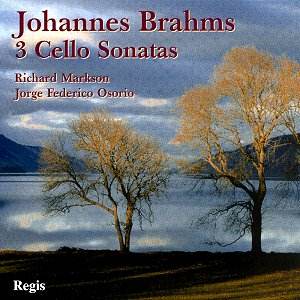Comparison recordings:
Janos Starker, cello; Abba Bogin, piano - Period
(now EMI) LP
Yo-Yo Ma, cello; Emmanuel Ax, piano - Sony SK 48191
Pablo Casals, cello; Mieczyslaw Horszowski, piano
- various collectors’ issue
That is a pretty intimidating list of performers
to go up against — Markson and Osorio must have been mad to record
these works. But, after listening, where do I think they belong
in that list? Where do I think you’ll think they belong in that
list? How about at the very top?
I remember my first experience with the Eminor
sonata; I knew nothing about chamber music and virtually nothing
about Brahms, but bought the record used for 75 cents because
I thought I might like it. At hearing the first notes I think
I melted like butter, I couldn’t believe a cello could make such
a beautiful sound; and my excitement didn’t let up until the last
note. That was the Starker performance, and I must say Markson
plays with that same dark liquid sound, the phrase floating above
the piano even though the sound is octaves below it. They achieve
a proper Viennese waltz lilt in the allegretto, although some
might want a little more. And the final fugue is all Brahms could
have hoped for. I never was so aware before that this is a three
voice fugue, with the piano and the cello tossing the extra voice
back and forth between them, and I’ve never heard it done any
better than here.
Markson and Osorio agree with the consensus that
the published transcriptions for cello of the ‘Regenlied’ violin
sonata Op 78 are not really by Brahms, so they felt free to
alter the published score for this performance it to make it closer
to the original. The result of their work is very successful;
the tone of the cello seems to suit the melancholy of the music
at least as well if not better than the violin, and the mass of
the cello tone is better balanced against the dense piano part,
so the pianist does not have to hold back his tone. Only at a
couple places in the last movement do I find myself wishing the
solo part were in a higher register.
The Opus 100 is less passionate and sensual than
the earlier work, with more sense of struggle, more conflict between
the players. When the cello is in a higher register the pianist
takes the opportunity to make more of the lower notes on the instrument
to very good effect. From the very first the piano seems to be
in control, and Mr. Osorio does an exceptional job here. Then
the second movement starts out with the cello accompanying the
piano! Then they take turns. But it is in the third movement where
their astounding ability to find the right balance is most perfectly
demonstrated. The balances in this movement can change within
the phrase. Not for a second can this music be left to play itself,
and they get it right every single time. This is breathtaking
virtuosity! After that they deserve a nice rest, and the sunny
final movement begins by reminding us of the final movement to
the second piano concerto, except that this piano part is more
difficult, no matter how easy Mr. Osorio makes it sound. Wouldn’t
you know it, a storm comes up threatening to to ruin our sunny
day, but all ends happily.
Paul Shoemaker
